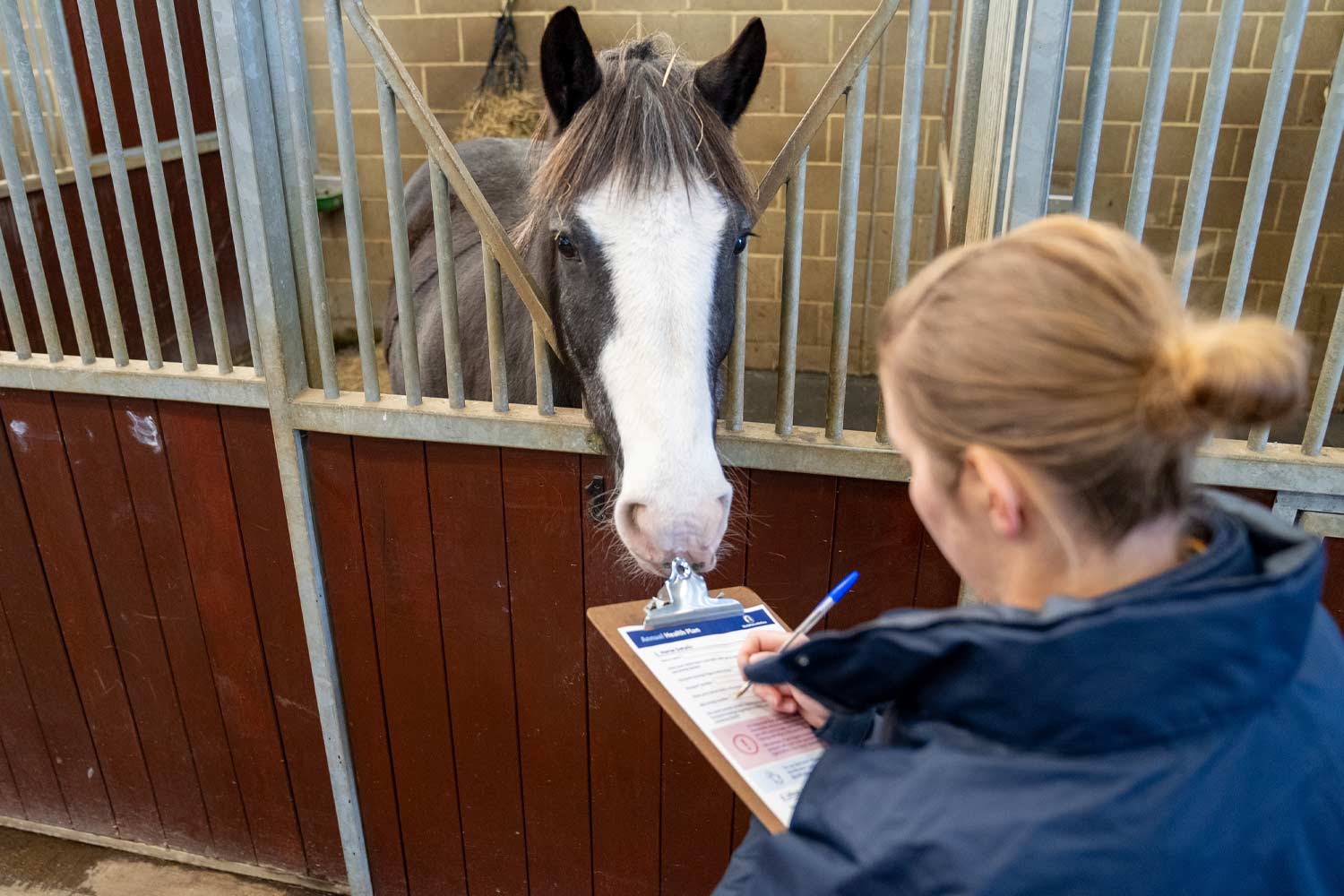We are implementing a range of sustainability initiatives across our four rescue and rehabilitation centres and head office.
Hall Farm and Head Office
Rainwater harvesting
Horses require lots of water! To drink, for bathing, cold hosing, soaking hay, and to keep yards and equipment clean. We also use water in food preparation, cleaning and flushing toilets. To help reduce our water use:
- We have installed a rainwater harvesting system able to provide enough water to flush the toilets at our visitor centre.
- We collect and store rainwater in a large tank next to the indoor arena for emergency use by the fire service, it also tops up a water butt for watering our plants.
- We installed a water butt at Head Office which is used for watering plants.


Lighting
From the stable yards to the indoor arena, our farms require a lot of lighting particularly in the winter months. Where possible, we are implementing energy saving strategies.
- We have put some lights on sensors to reduce the amount of time lights were left on unnecessarily.
Bat boxes
Bats are an essential part of the local ecosystem and when designing our new facilities, a key consideration was how we can use our new buildings to support them.
- The new crew yards were all fitted with bat boxes.
Introduction of electric vehicles
Reducing our carbon emissions has been a key part of our environmental sustainability strategy.
- We have switched some of our diesel cars for electric vehicles.
- Staff can opt into a programme to receive help if switching their car to an electric vehicle.
Refurbishing windows
We are dedicated to making sure all our buildings are as energy efficient as possible.
- Rather than replacing the windows at head office, we refurbished the existing windows to improve their thermal efficiency.
Sustainable printing
We generate a range of materials from our newsletter to leaflets on key welfare topics and it is important that we work with printers who share our environmentally friendly ethos and source their paper in a sustainable way.
Belwade Farm
Habitat cultivation
Our farm land provides vital habitats to a wide range of flora and fauna, which vary depending on location. Being aware of these individual habitats enables us to improve our care of them for the greatest impact.
- Across our farms we have left areas of grass to grow long, reduced hedge cutting and nurtured ponds – all of which encourages biodiversity.
- At Belwade Farm we are providing suitable habitats for the abundant and unique plant and animal life including rare species such as the Kentish Glory moth, helping to sustain the species.

Glenda Spooner Farm
Tree and hedge planting
As plants grow, they capture carbon helping to offset emissions. They also offer huge benefits for wildlife – creating corridors for animals, birds and insects to move through, providing food, shelter and places to nest and rest. Planted strategically, they also provide shelter and browsing interest for horses.
- We have already planted 1,950 trees and 840 hedge saplings around our farms.
- We are planting 600m of wildlife friendly hedging at Glenda Spooner Farm to improve the soil structure on a sloping site prone to water run-off, protecting the pasture and tracks and providing a shelter belt for grazing horses.
Introducing electric farm vehicles
It is important that our grooms can access all areas of our hilly site, and farm vehicles such as all terrain mules are essential for this.
- We are exploring the inclusion of electric mules to reduce our reliance on diesel.

Penny Farm
Manure management
Pasture management is very important for the control of worms in horses, usually with the regular removal of manure – however droppings are essential for environmentally beneficial dung beetles to flourish.
The way in which droppings are stored also has environmental impacts, as nutrient rich run-off is damaging if it gets into waterways.
Manure can be a useful sustainability tool – turning it into compost improves pasture and in the long-term it can be turned into an alternative fuel source.
- We are limiting poo picking to 2-3 times a week to effectively manage the risk of worms whilst also helping dung beetles thrive. (Source: Westgate Labs).
- We have made some fuel bricks from manure which can be stored and used over winter.

Cleaning skylights
Sometimes, a little bit of time and elbow grease can have a huge impact! That was certainly true to reduce our dependence on artificial lighting.
- By cleaning the skylights on the indoor arena roof, we have reduced the need to turn on the lights to help save energy.
Helping hedgehogs
Working collaboratively with local wildlife rescue organisations helps us maintain key populations which thrive around our farms and play key roles in local ecosystems.
To find out more about how we can all make the management of our horses more environmentally friendly, please see our ‘Sustainable equestrianism: making the management of our yards more environmentally friendly‘ webinar with environmental sustainability consultant, Ruth Dancer.
Popular advice in Environment

Pasture management for horse paddocks
Find out how to manage your paddock for the health of your horse, pasture and soil.

Winter horse care tips
Read our advice on how to care for your horse during winter, including our top ten tips on winter horse care.
Other advice categories
All webinar categories:
Call our Advice Line
+44 (0)1953 497 238Not found the advice you were looking for? Our friendly team of horse care experts offer free practical advice. What can we help you with today? Our advice line is available 8.30am-5:00pm, or you can email education@worldhorsewelfare.org.


